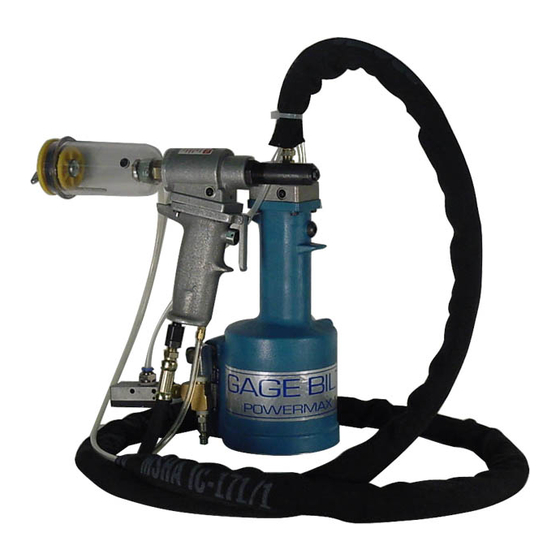Gage Bilt GB734SHV Manual - Página 4
Procurar online ou descarregar pdf Manual para Ferramentas de rebitar Gage Bilt GB734SHV. Gage Bilt GB734SHV 13 páginas. Installation tool

DESCRIPTION
WARNING:
The balance of this tool is designed for horizontal use and is not suited for any other applications.
Gage Bilt will be pleased to advise for your specific application.
The GB734SHV is a pneumatic-hydraulic split handle riveter with vacuum designed specifically for the efficient installa-
tion of a wide range of blind rivets. This tool's unique "split" system provides the operator with a lightweight ergonomic
tool. The handle and head cylinder assy when held in hand weighs just 2.25 lbs (1.02 kg)! The entire split handle riveter
weighs 7 1/4 lbs (3.29 kg). It has a 1.060 (26.92 mm) rivet setting stroke.
The GB734SHV split handle riveter operates on a wide range of air pressure, with 90 to 100 psi. (6-2-6.9 bar)providing maxi-
mum efficiency. At 90 psi. (6.2 bar), the GB734SHV does not exceed 81.5 dB (A) and consumes 3 cfm at 20 cycles per minute.
The GB734SHV comes with 8 feet of hose and a vacuum bottle for pintail collection.
The air inlet has a 1/4-18 female pipe threads for accepting the user's air hose fitting.
THE GB734SHV IS FURNISHED WITH NOSE ASSEMBLY 8N-743-24 AND WITH A SPARE NOSE TIP 10204 TO CONVERT
TO 6N-743-24 NOSE ASSEMBLY. ALL OTHER NOSE TIPS MUST BE ORDERED SEPARATELY. (See page 12 for nose as-
sembly recommendations.)
MAINTENANCE
WARNING:
Maintenance personnel
WARNING:
Disconnect tool from its power source before performing maintenance.
WARNING:
Excessive contact with hydraulic oil and lubricants should be avoided.
WARNING:
Dispose of Hydraulic Oil in accordance with applicable regulations.
WARNING:
Read MSDS documents for all applicable materials.
The performance of any tool depends upon good maintenance practices. Following these minimal requirements for
service and care will extend the life of your tool.
*Only use an air supply set at 90-100 p.s.i. (6.2-6.9 bar) equipped with a filter-regulator to prevent wear.
*The tool will eventually lose some hydraulic oil. Keep the hydraulic system full (only use Dexron III, or equivalent) and
free of air by using the air bleeder assy (704153) on a weekly basis.
*Proper care by operator is necessary in maintaining full productivity and reducing downtime. Read all applicable tool
manuals and nose assembly data sheets prior to operating tools.
*Keep nose assemblies, especially jaws, clean and free of chips and debris. Lube jaws and collet surfaces that jaws ride
on with light machine oil on a daily basis.
*All Screwed End Caps, Base Covers, Air Fittings, Actuators, Screws and Nose Assemblies are to be examined at the
end of each working shift to check that they are secure.
*Check tool, all hoses and all couplings daily for damage or air/hydraulic leaks. Tighten or replace
(if necessary).
*
For a complete overhaul, tool kit GB740TK is recommended.
HYDRAULIC THREAD PREPARATION
IMPORTANT:
Be sure to use thread sealant on all hydraulic fittings, Loctite® 30534 or similar Teflon® infused pipe
dope is recommended.
applied, pieces may enter the hydraulic system and cause malfunction and damage. Use 1 1/2 wraps
of tape on each thread. Cut off all loose tape ends. Tighten until fitting feels snug and then go 1/2 to a
full turn past that point.
CLEANING AND LUBRICATING PROCEDURE
Daily cleaning and lubrication of nose assembly will greatly reduce
downtime and increase life of components. Using sewing machine
oil, or an equivalent cleaner/lubricant, follow instructions below.
1. Disconnect tool vacuum line (if equipped).
2. Point nose assembly into oil as shown.
3. Cycle tool 8-10 times and wipe dry.
TORQUE SPECIFICATIONS
Socket Head Cap Screws (400061 and A-928) = 40 inch lbs.
Packing Plug (744118) = 45 foot lbs.
Flexlock Nut (400559) = 40 inch lbs.
End Cap (734111-1) = 45 foot lbs.
Button Head Cap Screws (402482) = 35-40 inch lbs. (Do NOT over-tighten)
MUST
read and understand all warnings and cautions.
CAUTION:
Teflon tape is an excellent thread sealer, however, if it not properly
CAUTION:
Over tightening can easily distort the threads.
4
Image may not reflect actual tool
3/12 REV 9/14
